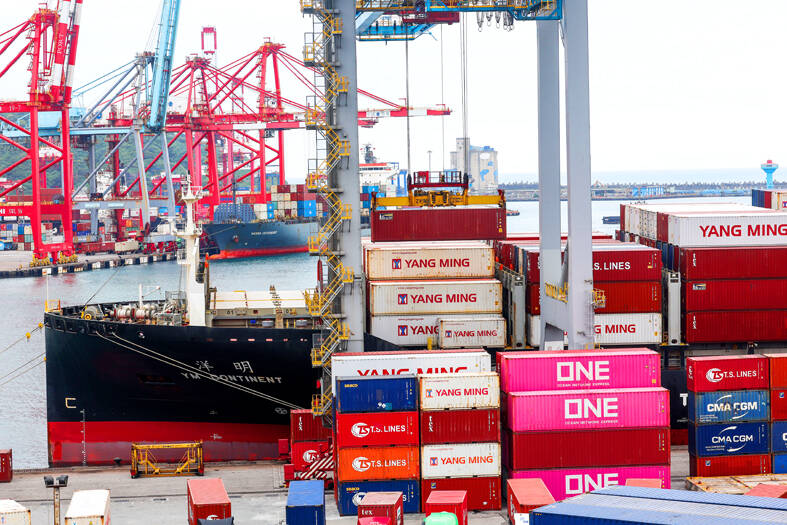The government’s business climate monitor last month flashed “green” for the second straight month, as the nation’s export-focused economy steadily gained traction thanks to improving outbound shipments and industrial production, the National Development Council (NDC) said yesterday.
The total score of the composite index of monitoring indicators' nine constituents gained two points to 29 from the previous month, indicating a continued state of recovery, NDC research director Wu Ming-huei (吳明蕙) said.
“Fast-growing global AI [artificial intelligence] demand is benefiting local firms on the supply chain, catapulting the gauges on exports, industrial output and overtime hours to booming territory,” Wu told a news conference in Taipei.

Photo: CNA
The recovery would grow more evident going forward, as inventory adjustments for technology products would come to an end soon, NDC Minister Kung Ming-hsin (龔明鑫) told a meeting of the legislature’s Economics Committee earlier this week.
The council uses a five-color system to capture the nation’s economic state, with “green” indicating steady growth, “red” suggesting a boom and “blue” reflecting a recession. Dual colors suggest a transition to a stronger or weaker state.
The index of leading indicators, which aims to forecast economic conditions in six months, increased 0.60 percent month-on-month to 101.68 last month, as readings on the labor accession rates, export orders, construction floor space, share prices and business confidence displayed positive movements, the council said.
The improvements came even though imports of semiconductor equipment and money supply remained soft, it said.
Semiconductor equipment is important because it sheds light on the capital spending of major local technology firms, as Taiwan is home to the world’s largest supplier of advanced chips.
The index of coincident indicators, which reflects the current economic situation, increased 0.32 percent to 100.40, aided by advances in industrial production and manufacturing sales, as well as wholesale, retail and restaurant revenue, the council said.
By contrast, the reading on electricity usage and export volume declined due to fewer working days, it said.
In related developments, the consumer confidence index this month inched up 0.29 points to 73.51, as people feel more optimistic about stock investment, economic growth and household income, a survey by National Central University showed yesterday.
The sentiment on stock investment rose 1.56 points, as the TAIEX remained above 20,000 points despite capital outflows.
The rising popularity of domestic and foreign exchange-traded funds lent support to the local bourse, said Dachrahn Wu (吳大任), director of the university’s Research Center for Taiwan Economic Development, which conducted the survey.
Capital flows to exchange-traded funds are not a bad thing, as they are common investment tools around the world and most target diversified blue-chip stocks, making them relatively stable compared with other investment vehicles, Wu said.

SEMICONDUCTORS: The German laser and plasma generator company will expand its local services as its specialized offerings support Taiwan’s semiconductor industries Trumpf SE + Co KG, a global leader in supplying laser technology and plasma generators used in chip production, is expanding its investments in Taiwan in an effort to deeply integrate into the global semiconductor supply chain in the pursuit of growth. The company, headquartered in Ditzingen, Germany, has invested significantly in a newly inaugurated regional technical center for plasma generators in Taoyuan, its latest expansion in Taiwan after being engaged in various industries for more than 25 years. The center, the first of its kind Trumpf built outside Germany, aims to serve customers from Taiwan, Japan, Southeast Asia and South Korea,

Gasoline and diesel prices at domestic fuel stations are to fall NT$0.2 per liter this week, down for a second consecutive week, CPC Corp, Taiwan (台灣中油) and Formosa Petrochemical Corp (台塑石化) announced yesterday. Effective today, gasoline prices at CPC and Formosa stations are to drop to NT$26.4, NT$27.9 and NT$29.9 per liter for 92, 95 and 98-octane unleaded gasoline respectively, the companies said in separate statements. The price of premium diesel is to fall to NT$24.8 per liter at CPC stations and NT$24.6 at Formosa pumps, they said. The price adjustments came even as international crude oil prices rose last week, as traders

SIZE MATTERS: TSMC started phasing out 8-inch wafer production last year, while Samsung is more aggressively retiring 8-inch capacity, TrendForce said Chipmakers are expected to raise prices of 8-inch wafers by up to 20 percent this year on concern over supply constraints as major contract chipmakers Taiwan Semiconductor Manufacturing Co (TSMC, 台積電) and Samsung Electronics Co gradually retire less advanced wafer capacity, TrendForce Corp (集邦科技) said yesterday. It is the first significant across-the-board price hike since a global semiconductor correction in 2023, the Taipei-based market researcher said in a report. Global 8-inch wafer capacity slid 0.3 percent year-on-year last year, although 8-inch wafer prices still hovered at relatively stable levels throughout the year, TrendForce said. The downward trend is expected to continue this year,

POWERING UP: PSUs for AI servers made up about 50% of Delta’s total server PSU revenue during the first three quarters of last year, the company said Power supply and electronic components maker Delta Electronics Inc (台達電) reported record-high revenue of NT$161.61 billion (US$5.11 billion) for last quarter and said it remains positive about this quarter. Last quarter’s figure was up 7.6 percent from the previous quarter and 41.51 percent higher than a year earlier, and largely in line with Yuanta Securities Investment Consulting Co’s (元大投顧) forecast of NT$160 billion. Delta’s annual revenue last year rose 31.76 percent year-on-year to NT$554.89 billion, also a record high for the company. Its strong performance reflected continued demand for high-performance power solutions and advanced liquid-cooling products used in artificial intelligence (AI) data centers,